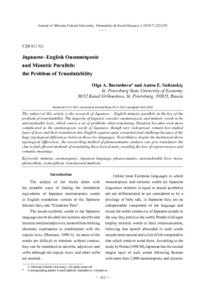Japanese–English Onomatopoeic and Mimetic Parallels: the Problem of Translatability
Скачать файл:
URI (для ссылок/цитирований):
https://elib.sfu-kras.ru/handle/2311/10223Автор:
Bartashova, Olga A.
Sichinskiy, Anton E.
Барташова, О.А.
Сичинский, А.Е.
Дата:
2014-02Аннотация:
The subject of this article is the research of Japanese – English mimetic parallels in the key of the
problem of translatability. The majority of linguists consider onomatopoeic and mimetic words to be
untranslatable lexis, which causes a set of problems when translating. Situation becomes even more
complicated as the onomatopoeic words of Japanese, though very widespread, remain low-studied
layer of lexis and their translation into English requires quite a translational challenge because of the
huge typological differences between these two languages. Nevertheless despite the mentioned above
typological differences, the researching method of phonosemantic analysis can give translators the
clue to find efficient methods of translating these lexical units, avoiding the loss of expressiveness and
semantic meanings Статья посвящена вопросам изучения звукоизобразительных параллелей между японским
и английским языком, в частности проблеме перевода звукосимволической лексики. Долгое
время данный тип лексики относился к безэквивалентной и непереводимой. Однако развитие
такого направления лингвистики, как фоносемантика, а также глубокое изучение вопроса
этимологии звукосимволических слов позволяет переводчику решить данную проблему.
Авторы статьи полагают, что наиболее эффективным методом перевода такой лексики
является поиск звукосимволических эквивалентов в языке перевода. Материалом исследования
послужила японская народная сказка “Urashima Taro”

